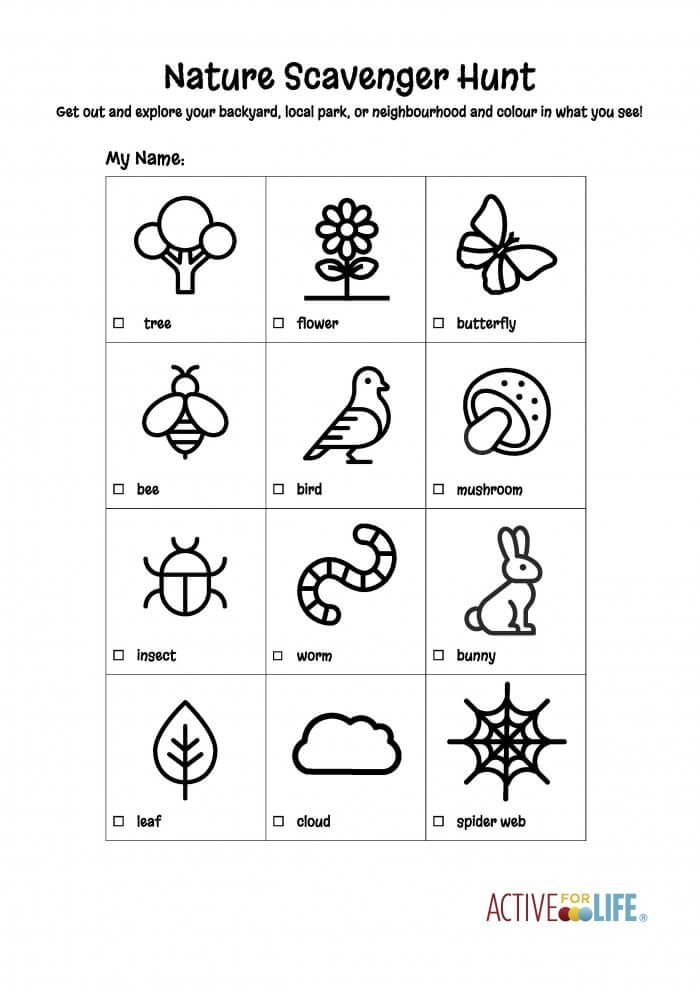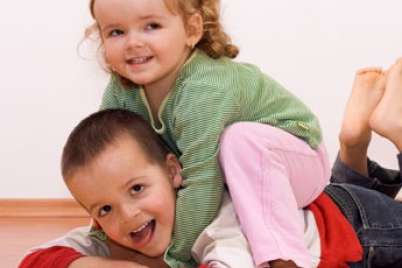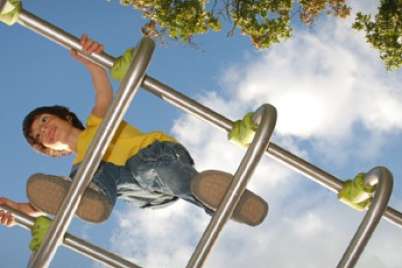
8 no-touch group games kids can play together
Editor’s note: This post was updated on June 17, 2021
These eight no-touch group games are easy to set up, and can help young children learn the concept of personal space.
1. Chalk challenge
This activity works well for playgrounds of all sizes, sidewalks, or even classrooms (just substitute masking tape for the chalk!). Children will learn to follow instructions and take turns, while practicing a variety of physical skills. Be creative and have fun!
Equipment: Sidewalk chalk
How to do it: Choose a starting point, then draw your way around the playground. Use different lines and shapes to indicate various movements. Have children move through the course one at a time.
Some ideas for different movement challenges:
- A straight line means to run along the line
- Hop or skip along a zigzag line
- A circle means to spin around, or to jump inside the circle
- Dots mean to tiptoe.
Draw sharks, water, and lava to add more thrills, or a big lollipop at the goal!
Related read: More ways to use chalk
2. Nature scavenger hunt
A natural playground is like a big treasure box for children. A scavenger hunt is a great way to prompt kids to explore and observe plants, animals, and objects outdoors.
Equipment: baskets and this worksheet [PDF]
How to do it: Print the free worksheet, take a basket, and send your little hunters out to find the items on your scavenger hunt list.
To provoke children’s curiosity, ask open-ended questions like, “Why do you think mushrooms grow here?” Or, “Where should I look if I want to find earthworms?”
When the hunt is done, allow children to take some natural treasures, like pebbles, flowers, and leaves back inside to use for crafts.
3. Animal hide and seek
Many children wonder what the toys do at night when everyone in the daycare has gone home. Here’s a playful opportunity to imagine what their animal friends have been up to!
Equipment: Animal toys (plastic or rubber toys for easy cleanup)
How to do it: Hide animal toys in the playground before taking children outside, and tell them that the toys escaped last night! Recruit some volunteers to help you find the animals. Even the most reluctant child will feel motivated to play outside. Not only does “animal escape” sound exciting, but children might also appreciate the opportunity to help the adults they care about solve a problem—something kids may not often have the chance to do.
To motivate children to play outside on a wet day, place toy cars around the schoolyard. Partially bury some of them and invite the kids to “rescue” the cars stuck in the mud.
4. Outdoor spray art
This playful art activity encourages kids to move and be creative.
Equipment: White or light-coloured fabric, food colouring, spray bottles
How to do it: Hang a piece of fabric on the fence or between trees. With children’s help, mix water and drops of food coloring in spray bottles to create your spray paints. Challenge children to spray to the very top, jump and spray, come in close to the fabric, or stand far away. Air-dry your fabric outside and then use it as a flag, in a blanket fort, or in another craft.
5. Outdoor dance party
Take your dance party outside! You’ll have more room to spread out while you boogie.
Equipment: Bluetooth speakers; optional: hula hoops, chalk
How to do it: Have an outdoor dance party with children’s favourite party music. Ask children to be aware of their “space bubbles” when dancing (place hula hoops on the ground, or draw boundaries with chalk if kids need a visual cue).
6. Outdoor obstacle course
Allow children to use their creativity and make their original obstacle course. This game is a great way to activate young bodies and minds.
Equipment: Wood or logs, hula hoops, cones, stepping domes, pool noodles, etc. Use anything you have on hand!
How to do it: Arrange an obstacle course with any simple tools and loose parts you have. Balance while walking along wood logs, jump over pool noodles, hop inside hula hoops, and knock down cones or plastic bottles.
7. Outdoor animal action game
Practice a menagerie of movement skills like running, jumping, hopping, leaping, crawling, rolling, and more by moving like different kinds of animals.
Equipment: None
How to play: Have children imitate animal movements (jump like a bunny, fly like a butterfly, run like a horse, etc). You can simply call out the animal names or sing this Hop Little Bunnies Action Song:
When you’ve learned the song, feel free to change the lyrics! Substitute “bunny” and “hop” with other animals and actions (horses gallop, birds fly, dinosaurs stomp, etc.).
8. Bubble time
What’s better than bubble time? It’s loads of active fun, and with a DIY bubble solution it’s practically free. You can also have children twist pipe cleaners to create their own bubble wands in different shapes.
Equipment: Bubble solution
How to play: To make your own bubble solution, gently mix 1 cup dish soap, 4 cups water, and 4 teaspoons sugar together in a bottle. Each child should have his/her own bubble solution and bubble wand to limit sharing.







Recently began helping a friend by interacting with her children while she works in her home and had forgotten a lot of fun activities to do. These are great suggestions and can cover wide age range. Thank you.
Thanks a lot. I am a PE teacher and these ideas will be useful especially during this pandemic period.
Thank for sharing these wonderful information.